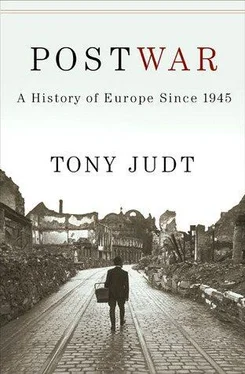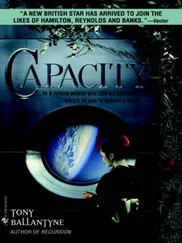In East Germany, where the burden of responsibility for Nazism was imputed uniquely to Hitler’s West German heirs, the new regime paid restitution not to Jews but to the Soviet Union. In GDR school texts, Hitler was presented as a tool of monopoly capitalists who seized territory and started wars in pursuit of the interests of big business. The ‘Day of Remembrance’ inaugurated by Walter Ulbricht in 1950 commemorated not Germany’s victims but eleven million dead ‘fighters against Hitler fascism’. Former concentration camps on East German soil—notably Buchenwald and Sachsenhausen—were converted for a while into ‘special isolation camps’ for political prisoners. Many years later, after Buchenwald had been transformed into a memorial site, its guidebook described the stated aims of ‘German fascism’ as ‘Destruction of Marxism, revenge for the lost war and brutal terror against all resisters’. In the same booklet, photos of the selection ramp at Auschwitz were captioned with a quote from the German Communist Ernst Thälmann: ‘The bourgeoisie is serious about its aim to annihilate the party and the entire avant-garde of the working class’. [427]This text was not removed until after the fall of Communism.
The same version of events could be found throughout Communist Europe. In Poland it was not possible to deny or minimize what had taken place in extermination camps at Treblinka or Majdanek or Sobibor. But some of these places no longer existed—the Germans had taken extraordinary pains to obliterate them from the landscape before fleeing the advancing Red Army. And where the evidence did survive—as at Auschwitz, a few kilometres from Crakow, Poland’s second city—it was retrospectively assigned a different meaning. Although 93 percent of the estimated 1.5 million people murdered at Auschwitz were Jews, the museum established there under the post-war Communist regime listed the victims only by nationality: Polish, Hungarian, German, etc. Polish schoolchildren were indeed paraded past the shocking photos; they were shown the heaps of shoes, hair and eyeglasses. But they were not told that most of it belonged to Jews.
To be sure, there was the Warsaw Ghetto, whose life and death were indeed memorialized on the site where the ghetto had stood. But the Jewish revolt of 1943 was occluded in Polish memory by the Poles’ own Warsaw uprising a year later. In Communist Poland, while no-one denied what Germans had done to Jews, the subject was not much discussed. Poland’s ‘re-imprisonment’ under the Soviets, together with the widespread belief that Jews had welcomed and even facilitated the Communist takeover, muddied popular recall of the German occupation. In any case, Poles’ own wartime suffering diluted local attention to the Jewish Holocaust and was in some measure competitive with it: this issue of ‘comparative victimhood’ would poison Polish-Jewish relations for many decades. The juxtaposition was always inappropriate. Three million (non-Jewish) Poles died in World War II; proportionately lower than the death rate in parts of Ukraine or among Jews, but a terrible figure notwithstanding. Yet there was a difference. For Poles, it was difficult to survive under German occupation, but in principle you could. For Jews it was possible to survive under German occupation—but in principle you could not.
Where a local puppet regime had collaborated with its Nazi overlords, its victims were duly memorialized. But scant attention was paid to the fact that they were disproportionately Jews. There were national categories (‘Hungarians’) and above all social categories (‘workers’), but ethnic and religious tags were studiously avoided. The Second World War, as we have seen (see Chapter 6), was labelled and taught as an anti-Fascist war; its racist dimension was ignored. After 1968, the government of Czechoslovakia even took the trouble to close Prague’s Pinkus Synagogue and paint over the inscriptions on its walls that gave the names of Czech Jews killed in the Shoah.
When re-casting recent history in this region, the post-war Communist authorities could certainly count on an enduring reservoir of anti-Jewish feeling—one reason they went to some trouble to suppress evidence of it even in retrospect (during the Seventies Polish censors consistently banned allusions to the country’s inter-war anti-Semitism). But if east Europeans paid less attention in retrospect to the plight of the Jews, it was not just because they were indifferent at the time or preoccupied with their own survival. It is because the Communists imposed enough suffering and injustice of their own to forge a whole new layer of resentments and memories.
Between 1945 and 1989 the accumulation of deportations, imprisonments, show trials and ‘normalizations’ made almost everyone in the Soviet bloc either a loser or else complicit in someone else’s loss. Apartments, shops and other property that had been appropriated from dead Jews or expelled Germans were all too often re-expropriated a few years later in the name of Socialism—with the result that after 1989 the question of compensation for past losses became hopelessly tangled in dates. Should people be recompensed for what they lost when the Communists seized power? And if such restitution were made, to whom should it go? To those who had come into possession of it after the war, in 1945, only to lose it a few years later? Or should restitution be made to the heirs of those from whom businesses and apartments had been seized or stolen at some point between 1938 and 1945? Which point? 1938? 1939? 1941? On each date there hung politically sensitive definitions of national or ethnic legitimacy as well as moral precedence. [428]
And then there were dilemmas peculiar to the internal history of Communism itself. Should those responsible for inviting Russian tanks in to crush the 1956 Hungarian revolution or suppress the Prague Spring of 1968 be arraigned for these crimes? In the immediate aftermath of the 1989 revolutions many thought they should. But some of their victims were former Communist leaders. Who deserved the attention of posterity: obscure Slovak or Hungarian peasants thrown off their property, or the Communist apparatchiks who ejected them but who themselves fell victim a few years later? Which victims—which memories—should have priority? Who was to say?
The fall of Communism thus brought in its wake a torrent of bitter memories. Heated debates over what to do with secret police files were only one dimension of the affair (see Chapter 21). The real problem was the temptation to overcome the memory of Communism by inverting it. What had once been official truth was now discredited root and branch—becoming, as it were, officially false. But this sort of taboo-breaking carries its own risks. Before 1989 every anti-Communist had been tarred with the ‘Fascist’ brush. But if ‘anti-Fascism’ had been just another Communist lie, it was very tempting now to look with retrospective sympathy and even favour upon all hitherto discredited anti-Communists, Fascists included. Nationalist writers of the nineteen-thirties returned to fashion. Post-Communist parliaments in a number of countries passed motions praising Marshal Antonescu of Romania or his counterparts elsewhere in the Balkans and central Europe. Execrated until very recently as nationalists, Fascists and Nazi collaborators, they would now have statues raised in honour of their wartime heroism (the Romanian parliament even accorded Antonescu one minute’s silence).
Other taboos fell along with the discredited rhetoric of anti-Fascism. The role of the Red Army and the Soviet Union could now be discussed in a different light. The newly liberated Baltic states demanded that Moscow acknowledge the illegality of the Molotov-Ribbentrop Pact and Stalin’s unilateral destruction of their independence. The Poles, having at last (in April 1995) secured Russian acknowledgement that the 23,000 Polish officers murdered in Katyn forest were indeed killed by the NKVD and not the Wehrmacht, demanded full access to the Russian archives for Polish investigators. As of May 2005 neither request seemed likely to meet with Russian acquiescence and the memories continued to rankle. [429]
Читать дальше












